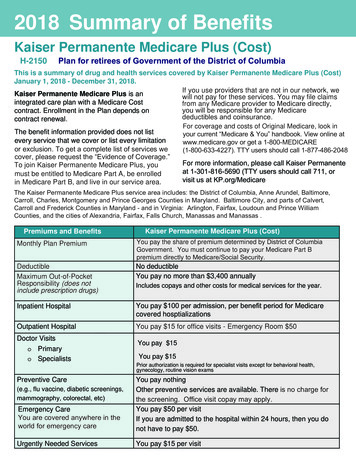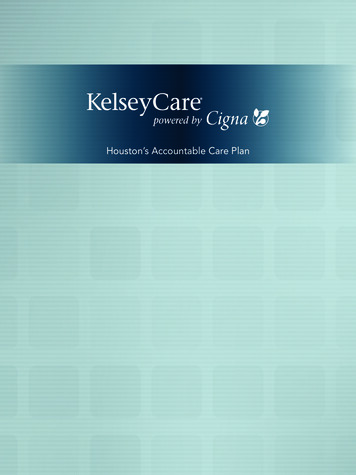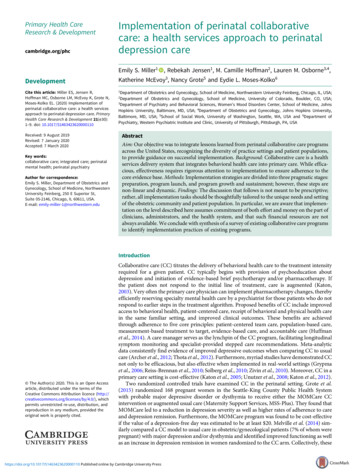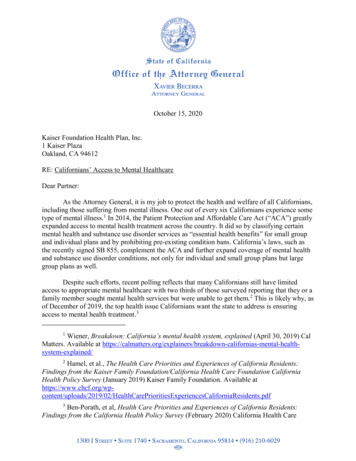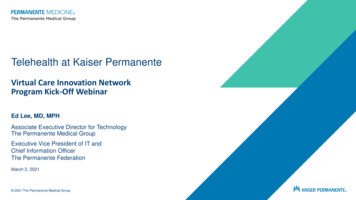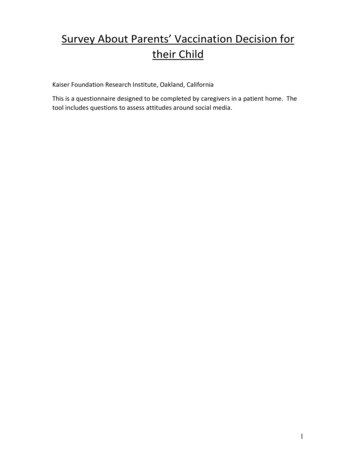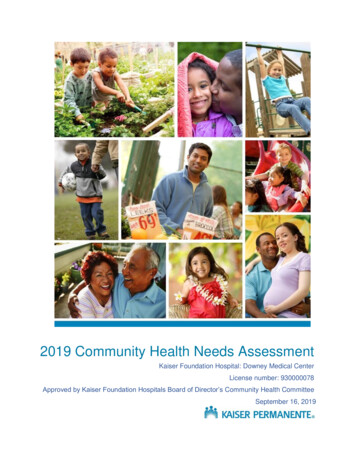
Transcription
Fiscal Year 2016–2017 Site Review ReportforAccountable Care Collaborative: AccessKaiser Permanente (ACC: Access KP)May 2017This report was produced by Health Services Advisory Group, Inc., for theColorado Department of Health Care Policy & Financing.
Table of Contents1.Executive Summary . 1-1Summary of Results . 1-2Standard I—Coverage and Authorization of Services . 1-3Summary of Strengths and Findings as Evidence of Compliance . 1-3Summary of Findings Resulting in Opportunities for Improvement . 1-3Summary of Findings Resulting in Required Actions. 1-4Standard II—Access and Availability . 1-6Summary of Strengths and Findings as Evidence of Compliance . 1-6Summary of Findings Resulting in Opportunities for Improvement . 1-7Summary of Findings Resulting in Required Actions. 1-8Standard IX—Subcontracts and Delegation. 1-8Summary of Strengths and Findings as Evidence of Compliance . 1-8Summary of Findings Resulting in Opportunities for Improvement . 1-9Summary of Findings Resulting in Required Actions. 1-92.Overview and Background . 2-1Overview of FY 2016–2017 Compliance Monitoring Activities . 2-1Compliance Monitoring Site Review Methodology . 2-1Objective of the Site Review . 2-2Appendix A. Compliance Monitoring Tool . A-1Appendix B. Record Review Tool. B-1Appendix C. Site Review Participants . C-1Appendix D. Corrective Action Plan Template for FY 2016–2017 . D-1Appendix E. Compliance Monitoring Review Protocol Activities . E-1ACC: Access KP FY 2016–2017 Site Review ReportState of ColoradoPage iAccessKP CO2016-17 PH SiteRev F1 0517
1. Executive SummaryColorado Revised Statutes 2013, 25.5-1-101—“State Health Care Policy and Financing Act”—providedthe authority for the Department of Health Care Policy & Financing (the Department) to enter into acontract with Colorado Access for implementation of a Medicaid payment reform pilot program using apartial-benefit, full-risk, value-based capitation structure. The purpose of the pilot program was to learnthe efficacy of this alternate Medicaid payment methodology in terms of total cost of care and the effecton health outcomes for members. Colorado Access’ contract with the Department allowed ColoradoAccess to subcontract any portion of the pilot program contract to Kaiser Foundation Health Plan ofColorado. Colorado Access’ contract with the Department required Colorado Access to comply withfederal Medicaid managed care regulations at 42 CFR 438 et seq. The Balanced Budget Act of 1997(BBA), Public Law 105-33, with revisions published May 2016, requires that states conduct a periodicevaluation of their Medicaid managed care organizations (MCOs) to determine compliance with federalhealthcare regulations and contractual requirements. The Department has elected to complete thisrequirement by contracting with an external quality review organization (EQRO), Health ServicesAdvisory Group, Inc. (HSAG).The payment reform contract between Colorado Access and the Department was effective July 2016.Fiscal year (FY) 2016–2017 represents the initial year of HSAG compliance reviews for the ColoradoAccess pilot program, Accountable Care Collaborative (ACC): Access Kaiser Permanente (AccessKP). This report documents results of the FY 2016–2017 site review activities for the review period ofJuly 2016 through March 2017. Access KP site review activities consisted of review for compliancewith federal Medicaid managed care regulations and State contract requirements. For each of the threestandard areas reviewed this year, this section contains summaries of strengths and findings as evidenceof compliance, findings resulting in opportunities for improvement, and required actions. Section 2describes the background and methodology used for the FY 2016–2017 compliance monitoring sitereview. Appendix A contains the compliance monitoring tool used for the review of standards.Appendix B contains details of the findings for Medicaid member services and claims denials recordreviews. Appendix C lists HSAG, health plan, and Department personnel who participated in some wayin the site review process. Appendix D describes the corrective action plan process the health plan willbe required to complete for FY 2016–2017 and the required template for doing so. Appendix E containsa detailed description of HSAG’s site review activities consistent with the Centers for Medicare &Medicaid Services (CMS) final protocol.ACC: Access KP FY 2016–2017 Site Review ReportState of ColoradoPage 1-1AccessKP CO2016-17 PH SiteRev F1 0517
EXECUTIVE SUMMARYSummary of ResultsBased on conclusions drawn from the review activities, HSAG assigned each requirement in thecompliance monitoring tool a score of Met, Partially Met, Not Met, or Not Applicable. HSAG assignedrequired actions to any requirement within the compliance monitoring tool receiving a score of PartiallyMet or Not Met. HSAG also identified opportunities for improvement with associated recommendationsfor some elements, regardless of the score. Recommendations for requirements scored as Met did notrepresent noncompliance with contract requirements or federal healthcare regulations.Table 1-1 presents the scores for Access KP for each of the standards. Findings for requirementsreceiving a score of Met are summarized in this section. Details of the findings for each requirementreceiving a score of Partially Met or Not Met follow in Appendix A—Compliance Monitoring Tool.Table 1-1—Summary of Scores for the Standards# ofElements# ofApplicableElements#Met#PartiallyMet# NotMet# NotApplicableScore(% of MetElements)38342482471%II. Access and Availability15131111285%IX. Subcontracts dsI.Coverage andAuthorization of Services*The overall score is calculated by adding the total number of Met elements and dividing by the total number of applicable elements.Table 1-2 presents the scores for Access KP for the denials record reviews. Details of the findings forthe record review are in Appendix B—Record Review Tool.Table 1-2—Summary of Scores for the Record Review# ofElements# ofApplicableElements#Met# NotMet# NotApplicableScore(% of %Record Review*The overall score is calculated by adding the total number of Met elements and dividing by the total number of applicable elements.ACC: Access KP FY 2016–2017 Site Review ReportState of ColoradoPage 1-2AccessKP CO2016-17 PH SiteRev F1 0517
EXECUTIVE SUMMARYStandard I—Coverage and Authorization of ServicesSummary of Strengths and Findings as Evidence of ComplianceCovered services of the Access KP contract are limited to 2,100 ambulatory primary and specialty carecodes. All covered services must be provided within the Kaiser Permanente (KP) network. All otherservices needed by members are provided through Medicaid fee-for-service (FFS). Colorado Accessdelegated all Access KP utilization management (UM) activities to KP. KP’s Resource StewardshipUtilization Management program and UM policies and procedures and processes ensure that KP deliversservices sufficient in amount, duration, and scope. KP’s UM authorization processes, applied to AccessKP contracted services only, demonstrated that KP applies several sources of medical necessity criteriain UM decision making; UM determinations are made by qualified clinicians; requesting providers areconsulted when necessary; and members and providers are notified in writing of UM decisions. KPconducts annual interrater reliability monitoring of staff and physician reviewers. UM policies addressedprocedures for authorization of services and timelines for UM decision making and notification. Noticesof action (NOAs) to members and providers included all required information.Although Access KP is generally liable for only professional services associated with an emergencycondition (the facility fee is the responsibility of Medicaid FFS), staff members stated that KP performsno UM review of emergency room (ER) claims and no ER claim is denied for any reason. Poststabilization services are the responsibility of the Medicaid FFS program.On-site denial record reviews confirmed the following: All 10 cases involved a new request for services; five were standard pre-service requests, three wereexpedited pre-service requests, two were retrospective requests.No cases included an extension of the decision time frame.HSAG found that in all 10 cases the authorization decision was based on established criteria andmade by a qualified clinician, an NOA was sent to the member and provider, and the NOA includedrequired content.Summary of Findings Resulting in Opportunities for ImprovementOn-site denial record reviews identified the following opportunities for improvement: Seven of 10 cases were denied due to requests for out-of-network services (Access KP members arerequired to receive covered services within the KP network). Two of 10 cases were deniedretrospectively because the provider assumed that the member was traditional Medicaid and failed torequest pre-service authorization from Access KP. These findings may indicate that some membersand providers remain confused about the unique requirements of the Access KP program. HSAGrecommends that Colorado Access and KP consider clarifying communications to members andACC: Access KP FY 2016–2017 Site Review ReportState of ColoradoPage 1-3AccessKP CO2016-17 PH SiteRev F1 0517
EXECUTIVE SUMMARY providers to reinforce both the requirement that KP members receive services in network and theneed for providers to confirm Access KP membership prior to providing services.HSAG observed that some information in the NOA, such as advising the member that an alternativeis for the member to pay for the requested service personally or through other insurance, may beinappropriate for Medicaid members. HSAG recommends that KP revise its NOA for Medicaidmembers to more clearly explain that the alternative for an out-of-network denial is to obtain theservice within the KP network.The NOA appeal template included some information that was either irrelevant—for example,“determine which one of the adverse benefit determination notices listed below you received byreading the “Claim Type” indicated on the first page of your notice: Post-Service Claim DenialNotice; Pre-Service Claim Denial Notice; Concurrent Care Claim Denial Notice,” or was written inlanguage not easy to understand. HSAG recommends that KP review and revise the template YourAppeal Rights to simplify the information provided and ensure ease of understanding (at or near thesixth-grade reading level) for Medicaid members.HSAG noted that the template NOA letter includes many drop-down boxes and free-form text fieldsthat could result in correspondence to members that is difficult to understand. HSAG recommendsthat KP consider assigning an individual to perform manual review of each Access KP letter prior tomailing to ensure that it includes language and information appropriate for a Medicaid member.KP’s UM policies and procedures for processing authorization requests were inclusive of all lines of KPbusiness and sometimes failed to clearly distinguish the requirements applicable to Access KP. HSAGalso observed several inconsistencies or gaps in policies that could contribute to confusion for UMreviewers. Specific examples include: The Timeliness of UM Decision-Making and Notification policy addresses outreach to therequesting provider to obtain more information only when related to urgent pre-service requests. Inaddition, the policy addresses time frames for expedited authorization decisions, but only related toCHP , not to Access KP.The Denial of Coverage policy addresses consulting with the requesting physician when necessary,but only related to members of Medicare or commercial contracts. Similarly, the policy defines thecontent of the NOA, but only related to CHP , not to Access KP.HSAG recommends that KP carefully review and update its UM policies and procedures to ensure thatrequirements applicable to Access KP are clearly and accurately delineated.Summary of Findings Resulting in Required ActionsThe KP Medical Necessity Criteria policy outlined numerous sources of medical necessity criteria usedin making UM decisions. The Authorization of Services policy stated that KP ensures that benefits areno more restrictive than defined in “state statutes and regulations and the State Plan.” However, KPpolicies and procedures did not outline the specific medical necessity criteria applicable to Medicaidmembers or refer staff members to another source to obtain these criteria. Colorado Access must ensureACC: Access KP FY 2016–2017 Site Review ReportState of ColoradoPage 1-4AccessKP CO2016-17 PH SiteRev F1 0517
EXECUTIVE SUMMARYthat KP updates its UM policies and procedures applicable to Access KP authorization decisions toclearly define the medical necessity criteria outlined in the State plan. HSAG recommends that KP usethe definition of “medical necessity” outlined in the State Medicaid Plan—10 CCR 2505-10 8.076.1.8(effective August 30, 2016)—to update its policies and procedures.The Timeliness of UM Decision-Making and Notification policy specified that the timeline for standardauthorization decisions was 10 calendar days for Access KP members. However, HSAG identified indenial record reviews that three of 10 records included notices of action not compliant with this timeframe. Colorado Access must ensure that KP provides NOAs to members for standard authorizationdecisions within 10 calendar days from receipt of the request for service.HSAG noted in on-site denial record reviews that some template language included in the NOA did notensure ease of understanding or approach sixth grade reading level. In addition, HSAG identified onerecord in which the free-form text explanation of the reason for denial was highly technical. ColoradoAccess must ensure that KP’s NOAs to Access KP members are written in language and format whichensure ease of understanding for the member (i.e., sixth grade reading level where possible).KP’s Timeliness of UM Decision-Making and Notification policy addressed time frames for makingUM decisions for standard and expedited decisions and related extensions. Staff members stated that KPdoes not terminate or reduce previously approved authorizations for members. However, the policyomitted reference to other notification time frame requirements applicable to Medicaid members,specifically: For service authorization decisions not reached within the required time frames on the date the timeframe expires.If the Contractor extends the time frame, no later than the date the extension expires.For denial of payment, at the time of any action affecting the claim.In addition, staff members were unable to confirm whether or not claims payment procedures werealigned with the requirement to provide an NOA to the member at the time of any action affecting theclaim (i.e., denial of payment decisions). Colorado Access must ensure that KP updates its policies andprocedures to address all notification time frames applicable to Access KP members as outlined in therequirement. Colorado Access must also confirm that KP’s claims payment procedures are aligned withthe requirement to provide an NOA to the member at the time of denial of claim payment (excludesadministrative denials).KP did not have policies and procedures to address Early and Periodic Screening, Diagnostic, andTreatment (EPSDT) requirements. Staff members stated that some operational processes were in placewithin the KP network to ensure provision of EPSDT services and that KP has implemented theAmerican Academy of Pediatrics (AAP) Bright Futures periodicity schedule. Staff members also statedthat KP intended to develop written EPSDT policies and procedures to address comprehensive EPSDTrequirements based on results of the on-site audit. Colorado Access must ensure that KP develops andimplements written policies and procedures related to comprehensive EPSDT services and requirementsfor members ages 20 and under. KP must address in its policies, procedures, and operational processes:ACC: Access KP FY 2016–2017 Site Review ReportState of ColoradoPage 1-5AccessKP CO2016-17 PH SiteRev F1 0517
EXECUTIVE SUMMARY Mechanisms used by KP to implement the AAP Bright Futures periodicity schedule.Provision of all required components of periodic health screens (as outlined in Element #34 of thecompliance monitoring tool).Provision of diagnostic and treatment services needed as a result of EPSDT screening (includingvision services, dental services, and immunizations), even if services are not covered under theAccess KP plan.Requirements and provider expectations related to referrals and authorizations for EPSDT-relatedcare in or out of network.Assurance that EPSDT beneficiaries may self-refer for routine vision, dental, hearing, or mentalhealth services; or for family planning services.The definition of “medical necessity” for EPSDT services as outlined in the State Medicaid Plan (10CCR 2505-10 8.076.1.8 and 8.076.1.8.1) and application of EPSDT-specific criteria in UMdecisions.Mechanisms for systematic—i.e., regular and periodic—communications with network providersregarding the Department’s EPSDT requirements.Standard II—Access and AvailabilitySummary of Strengths and Findings as Evidence of ComplianceColorado Access delegated provision of primary care and specialty services for Access KP members toKP. KP documented having an extensive network of primary care and specialist providers available toserve all KP members in the Access KP service area. Per design of the Access KP pilot program,Access KP members were previously receiving services from KP at the initiation of the contract, and noincrease in Access KP membership was anticipated. Access KP’s approximately 22,700 membersrepresented only a small portion of the total KP membership in the service area. Staff stated that allAccess KP covered services can be provided in network. KP’s Network Adequacy analysis documentednumbers, types, and geographic locations of primary care and specialist providers in excess of contractrequirements. KP eliminated from the analysis those providers with full practices. KP conducts quarterlymonitoring of practitioner panel status and appointment availability in order to determine any stress onprovider network availability and responds to any potential capacity issues through recruitment orrelocation of providers as necessary.KP provided female members with direct access to obstetrics/gynecology (OB/GYN) practitioners andprovided for second opinions in network. Although by design all covered services can be providedwithin the KP network, KP arranged for covered services out of network if services could not beprovided in network. Staff stated that when the member needs services not covered by the Access KPcontract—i.e., Medicaid FFS—providers continue to clinically manage the member, make necessaryreferrals, and bill FFS as applicable. KP’s appointment scheduling guidelines for all members were morestringent than those defined in the Access KP contract, and were monitored quarterly. The KP networkACC: Access KP FY 2016–2017 Site Review ReportState of ColoradoPage 1-6AccessKP CO2016-17 PH SiteRev F1 0517
EXECUTIVE SUMMARYincludes a variety of individual and group providers qualified to provide EPSDT services. The HealthFirst Colorado member handbook informs members of the availability of EPSDT services.KP demonstrated that it had a multifaceted national diversity policy and implemented local proceduresto promote cultural competency among providers and staff. KP provided live workshops and seminarsand webinar trainings covering a variety of cultural diversity topics, and required staff and providers toparticipate in annual cultural diversity training. KP offers verbal and written translation for membercommunications in numerous languages. Staff stated that KP has, in an effort to provide culturallysensitive services beyond language translation, integrated personnel representing various ethnic groupsinto medical offices which serve high-volume ethnic populations.Summary of Findings Resulting in Opportunities for ImprovementAccess KP used several member handbooks as sources of information to members. HSAG observed thatinformation in these member communications, specifically in the Access KP Guide and Denver/BoulderMember Resource Guide, included some information that was either inaccurate or inconsistent asfollows: The Denver/Boulder Member Resource Guide (available to all KP members) informed members thatthey may see an OB/GYN physician for routine care while maintaining a primary care provider(PCP) for other needs. However, another section of the guide lists OB/GYN practitioners asspecialists and states “Medicaid members require a referral to see a specialist.” These two statementsappear to be in conflict and should be clarified to communicate that Medicaid members do need areferral to see a women’s health specialist.The Denver/Boulder Member Resource Guide stated that KP members may obtain a second opinionfrom a Kaiser physician and may consult with a non-plan physician “at your own expense.” This isinaccurate for Medicaid members, who may obtain a second opinion outside the network if there isno other qualified healthcare professional within the network, at no cost to the member. KP shouldclarify this statement for Medicaid members.The Access KP Guide stated that a referral was required for members to obtain out-of-networkservices, but failed to clearly inform the member that if services are not available in network, KPwill provide an out-of-network referral. HSAG recommends that KP consider enhancing thiscommunication to comply with the related requirement for referral to out-of-network services, asspecified in Element #6 of the compliance monitoring tool.The Access KP Guide lists 30 days as the appointment time frame for all types of services excepturgent care. This information is out of compliance with scheduling requirements of the Access KPcontract as well as with KP’s own scheduling standards. KP should revise the Access KP Guide tobe in compliance with the scheduling standards of the contract.ACC: Access KP FY 2016–2017 Site Review ReportState of ColoradoPage 1-7AccessKP CO2016-17 PH SiteRev F1 0517
EXECUTIVE SUMMARYSummary of Findings Resulting in Required ActionsThe KP integrated provider system and additional availability of numerous types of specialists withinthe external contracted network appear to provide sufficient ongoing access to specialists for memberswith special healthcare needs. However, Access KP members are required to have a referral to see aspecialist. Colorado Access must ensure that KP referral or UM policies and procedures clearly specifythat persons with special healthcare needs who use specialists frequently are allowed to maintain thesetypes of specialists as PCPs or be allowed direct access or standing referrals to specialists.Although staff members described general referral policies for all members needing additional diagnosisand treatment, as well as a general overview of KP’s pediatric quality assurance program, KP did nothave EPSDT-specific policies and procedures to address the requirement that providers either refermembers to an appropriate practitioner or to Healthy Communities for further EPSDT-related diagnosisand treatment. KP also did not provide evidence of informing providers of EPSDT-related servicesavailable through other entities or of information pertaining to Healthy Communities. Colorado Accessmust ensure that KP addresses EPSDT diagnosis and treatment referral requirements, educates providersabout Healthy Communities, and advises providers of EPSDT services available through other entities.Standard IX—Subcontracts and DelegationSummary of Strengths and Findings as Evidence of ComplianceThe KP delegation agreement specified that the following functions were delegated to KP: caremanagement, communications, finance, claims payment, data management/information technology,member enrollment, UM, appeals and grievances, network management, and provision of primary andspecialty services. Colorado Access specified in both the delegation agreement and contractmanagement plan (CMP) a list of deliverables to assist Colorado Access in oversight of functionsdelegated to the subcontractor. Colorado Access’ CMP defined multiple mechanisms for monitoringKP’s performance of delegated functions and included evaluation of deliverables, annual on-sitereviews, and a comprehensive delegation audit of “deliverables” to be performed every six months.Colorado Access and KP had a joint operating group that met weekly to discuss the implementation ofthe structural components of the contract. Colorado Access and KP also jointly participated in thePerformance Improvement Advisory Committee (PIAC), designated as the oversight mechanism foroutcome measurement goals of the Access KP pilot program. Prior to implementation of the contract,the Department performed a readiness review of select elements of the Access KP contract that includedreview of both COA and KP processes. HSAG determined that the readiness review would suffice as apre-delegation evaluation of the subcontractor’s ability to perform delegated activities. The KPdelegation agreement addressed all required components, including activities and reporting requirementsdelegated to the subcontractor, provisions for revocation and sanctions, requirements to comply withapplicable federal and State laws, and insurance requirements. Colorado Access had certified that KP isnot debarred, suspended, or otherwise excluded by any federal agency; does not employ or contract withillegal aliens; holds members harmless from financial responsibility; and had informed members ofACC: Access KP FY 2016–2017 Site Review ReportState of ColoradoPage 1-8AccessKP CO2016-17 PH SiteRev F1 0517
EXECUTIVE SUMMARYmember rights and responsibilities. Colorado Access had developed a deliverable tracking schedule tomonitor receipt of deliverables from KP and, at the time of on-site review, reported receipt of multipledeliverable reports from KP. Colorado Access conducted one on-site review in September 2016, whichconsisted of an encounters/claims validation audit and a medical record review of advance directives,many elements of care coordination, and interpreter services.Summary of Findings Resulting in Opportunities for ImprovementWhile the KP delegation agreement broadly stated that KP must comply with federal and State laws, itspecified few of the applicable laws by name. HSAG recommends that Colorado Access update thedelegation agreement to specify all federal and State laws required in the contract with the Department.Due to the fact that most functions and requirements of the Access KP contract were delegated, it wouldappear that adequate oversight and monitoring by Colorado Access would require extensive resources. Itwas not apparent to HSAG which Colorado Access organizational resources were engaged in theoversight and monitoring processes. HSAG recommends that Colorado Access enhance its internalmonitoring plan to designate staff responsibilities for monitoring and analysis of the various activitiesdelegated to KP.The CMP stated that Colorado Access would perform a delegation audit of the detailed contract“deliverables,” but it was unclear what Colorado Access intended to address in the audit. HSAGrecommends that Colorado Access consider designing the proposed delegation audit to comprehensivelyaddress all applicable federal requirements related to the subcontractor’s delegated activities.Summary of Findings Resulting in Required ActionsThe KP delegation agreement specified that numerous—if not all—operational requirements of theAccess KP contract were delegated to KP. The Department’s contract with Colorado Access specifiesthat Colorado Access is accountable for all 42 CFR Part 438 requirements related to these delegatedactivities. While the CMP outlined multiple mechanisms for monitoring the subcontractor’sperformance, Colorado Access submitted no documents which provided evidence that it hadimplemented or intended to implement oversight or audit of KP’s operational processes related
The payment reform contract between Colorado Access and the Department was effective July 2016. Fiscal year (FY) 2016-2017 represents the initial year of HSAG compliance reviews for the Colorado Access pilot program, Accountable Care Collaborative (ACC): Access Kaiser Permanente (Access KP). This report documents results of the FY 2016-2017 .


